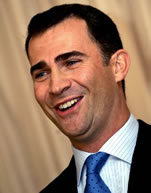Princess Letizia gives birth to a girl
Letizia arrived at Madrid's Ruber hospital last night accompanied by Prince Felipe and a crowd of journalists started to gather at the gates. It was the second time she had attended the clinic with contractions. Just after midnight the Zarzuela Palace sent mobile phone text messages to the journalists waiting outside saying that the Princess had been admitted into the hospital in order to give birth.
 An hour or so later, Prince Felipe appeared to thank the journalists for waiting in the cold rain and to announce the birth by cesarean section of their baby daughter, Leonor. He said that his wife had been conscious throughout the birth, and he had been at her side, that mother and daughter were both well, and that he and Letizia were radiant with happiness.
An hour or so later, Prince Felipe appeared to thank the journalists for waiting in the cold rain and to announce the birth by cesarean section of their baby daughter, Leonor. He said that his wife had been conscious throughout the birth, and he had been at her side, that mother and daughter were both well, and that he and Letizia were radiant with happiness.The fact that the royal couple's first child is a girl is bound to reopen the debate about a possible change in the Spanish constitution regarding succession rights. At it stands now, succession to the Spanish Throne is set out according to the rules of male-preference primogeniture. But this is generally accepted as being out-dated and most Spaniards would probably support a change in the constitution in favour of lineal primogeniture (inheritance by the oldest surviving child without regard to gender). The Socialist government included such a change in its electoral manifesto, although of course the whole debate about constitutional change in Spain at the moment is dominated by the Catalan issue.
Labels: Spanish royals


